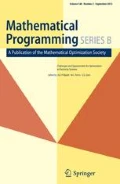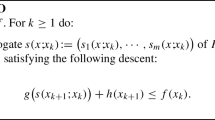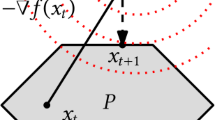Abstract
This paper provides an answer to the following basic problem of convex multi-objective optimization: Find a saddle-point condition that is both necessary and sufficient that a given point be Pareto optimal. No regularity condition is assumed for the constraints or the objectives.
Similar content being viewed by others
References
R.A. Abrams and L. Kerzner, “A simplified test for optimality,”Journal of Optimization Theory and Applications 25 (1978) 161–170.
K.J. Arrows, “An extension of the basic theorems of classical welfare economics,”Proceedings of the Second Berkeley Symposium on Mathematical Statistics and Probability, J. Neyman, editor (University of California Press, Berkeley, California, 1951).
A. Ben-Israel, A. Ben-Tal and A. Charnes, “Necessary and sufficient conditions for a Pareto optimum in convex programming,”Econometrica 45 (1977) 811–820.
A. Ben-Israel, A. Ben-Tal and S. Zlobec,Optimality in Nonlinear Programming: A Feasible Directions Approach (Wiley-Interscience, New York, 1981).
A. Charnes and W.W. Cooper,Management Models and Industrial Applications of Linear Programming, Vol. 1 (Wiley, New York, 1961).
G. Debreu,Theory of Value, An Axiomatic Analysis of Economic Equilibrium (Wiley, New York, 1959).
A.M. Geoffrion, “Proper efficiency and the theory of vector maximization,”Journal of Mathematical Analysis and Applications 42 (1968) 618–630.
M.D. Intriligator,Mathematical Optimization (Prentice-Hall, Englewood Cliffs, 1971).
S. Karlin,Mathematical Methods and Theory in Games, Programming and Economics, Vol. 1 (Addison-Wesley, Reading, Mass., 1959).
M.E. Salukvadze,Vector-Valued Optimization Problems in Control Theory (Academic, New York, 1979).
S. Smale, “Global analysis and economics III,”Journal of Mathematical Economics 1 (1974) 107–117.
S. Smale, “Global analysis and economics VI,”Journal of Mathematical Economics 3 (1976) 1–14.
J. Valyi, “Approximate saddle-point theorems in vector optimization,”Journal of Optimization Theory and Applications 55 (1987) 435–448.
T.L. Vincent and W.J. Grantham,Optimality in Parametric Systems (Wiley-Interscience, New York, 1981).
P.L. Yu, “Cone convexity, cone extreme points, and nondominated solutions in decision problems with multiobjectives,” in:Multicriteria Decision Making and Differential games, G. Leitmann, editor (Plenum, New York, 1976).
X. Zhou, F. Sharifi Mokhtarian and S. Zlobec, “A simple constraint qualification in convex programming,”Mathematical Programming 61 (3) (1993) 385–397.
S. Zlobec, “Two characterizations of Pareto minima in convex multicriteria optimization,”Aplikace Matematiky 29 (1984) 342–349.
S. Zlobec, “Characterizing optimality in mathematical programming models,”Acta Applicandae Mathematicae 12 (1988) 112–180.
Author information
Authors and Affiliations
Additional information
Research partly supported by the Natural Sciences and Engineering Research Council of Canada.
Corresponding author.
Contribution of this author is a part of her M.Sc. Thesis in Applied Mathematics.
Rights and permissions
About this article
Cite this article
van Rooyen, M., Zhou, X. & Zlobec, S. A saddle-point characterization of Pareto optima. Mathematical Programming 67, 77–88 (1994). https://doi.org/10.1007/BF01582213
Received:
Revised:
Issue Date:
DOI: https://doi.org/10.1007/BF01582213




